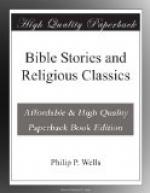After this was a man of the house of Levi went out and took a wife of his kindred, which conceived and brought forth a son, and he saw him elegant and fair, and hid him three months, and when he might no longer hide him, took a little crib of rushes and wickers and pitched it with glue and pitch, and put therein the child, and set it on the river, and let it drive down in the stream, and the sister of the child standing afar, considering what should fall thereof. And it happed that same time, the daughter of king Pharaoh descended down to the river for to wash her in the water, and her maidens went by the brink, which then, when she saw the little crib or fiscelle she sent one of her maidens to fetch and take it up, which so fetched and brought to her, and she saw therein lying a fair child; and she having pity on it said: This is one of the children of the Hebrews. To whom anon spake the sister of the child: Wilt thou, said she, that I go and call thee a woman of the Hebrews that shall and may nourish this child? She answered: Go thy way. The maid went and called his mother, to whom Pharaoh’s daughter said: Take this child and nourish him to me, and I shall give to thee thy meed and reward. The mother took her child and nourished it, and when it was weaned and could go she delivered it to the daughter of king Pharaoh, whom she received and adopted instead of a son and named him Moses, saying that I took him out of the water. And he there grew and waxed a pretty child. And as Josephus, Antiquitatum, saith: This daughter of Pharaoh, which was named Termuthe, loved well Moses and reputed him as her son by adoption, and on a day brought him to her father, who for his beauty took him in his arms and made much of him, and set his diadem on his head, wherein was his idol. And Moses anon took it, and cast it under his feet and trod on it, wherefore the king was wroth, and demanded of the great doctors and magicians what should fall of this child. And they kalked on his nativity and said: This is he that shall destroy thy reign and put it under foot, and shall rule and govern the Hebrews. Wherefore the king anon decreed that he should be put to death. But others said that Moses did it of childhood and ought not to die therefore, and counselled to make thereof a proof, and so they did.




